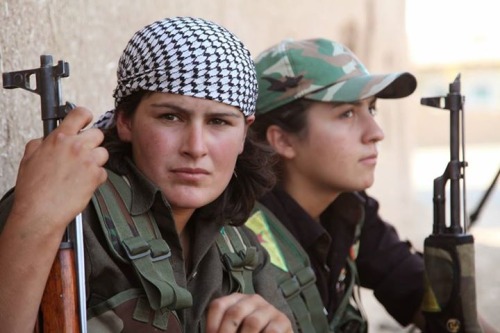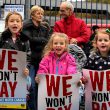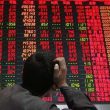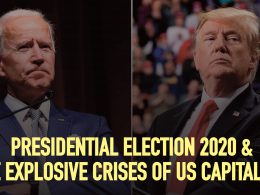By Serge Jordan, CWI
The situation in Kobanê has put the Kurdish question in the centre of attention worldwide. The canton of Kobanê, part of Rojava (or Western Kurdistan), has been under siege since mid-September by the cut throats of the ‘Islamic State’ (IS) – and has become one of the central points of resistance to the jihadists’ rampage.
While much of Syria has descended into a reactionary sectarian war, the three predominantly Kurdish enclaves of Rojava were deserted by the forces of Assad’s regime in 2012. In Rojova, “self-administration” and territorial autonomy was proclaimed by the political forces who seized political power since, which were dominated by the PYD (Democratic Union Party – the Syrian variant of the Kurdistan Workers’ Party, or PKK), and a fragile ethnic and religious balance has been maintained. The long-denied Kurdish identity and language were recognised, as were formal rights for ethnic minorities and religious groups.
Islamic State has been attacking Kobanê, the most vulnerable and exposed cantons of Rojava, for almost all sides with heavy weaponry, tanks and missiles, trying for more than five weeks to crush that city’s resistance. Rojava and its explicitly secular model has represented a direct defiance to the IS’s reactionary theocratic agenda. Female fighters armed with AK-47s at the forefront of a battle against an utterly misogynist group have captured the imagination of many people around the world.
Contrasted with the atrocities taking place in large parts of Iraq and Syria, the cantons of Rojava have been a symbol of resistance for millions of Kurds, workers and young people in the region. Demonstrations, occupations and protests actions have been also staged across Europe in support of the struggle in Kobanê, in which members of the CWI have regularly taken part.
The gains of Rojava and the resistance in Kobanê have offered a potential bridge on the road of the Kurds for self-determination and, more generally, a possible reference point for reviving the struggle of workers and poor against the horrors of IS and of the dictatorial regimes in the Middle East. However, all the political complications and dangers of what has recently unfolded in this area need to be addressed, as a defeat of this struggle would, on the contrary, unleash further sufferings for the peoples of the region.
Kobanê holding out
Many commentators were predicting that Kobanê would fall in a matter of days but its fate lies still in the balance, despite parts of the town under jihadist control. One of the reasons for that is the fact that the PYD and its armed units, the YPG (People’s Protection Units) and YPJ (Female’s Protection Units), have been fighting heroically. In fact, they have been, so far, the only effective ground fighters against IS’s advance. This stands out compared to the poor performances of the totally corrupt Iraqi army, and of the Peshmerga forces (the armed forces of the semi-autonomous Kurdish government of Northern Iraq) which ceded the Sinjar Mountains and other areas to IS almost without a fight. It shows that when people have a serious goal to fight for, their morale and determination can even overcome, to an extent, their technical and military inferiority.
This has put US imperialism and its military crusade against IS – so far, not crowned with any real successes – under mounting pressure. Initially, the US strategists were ready to see Kobanê being captured by IS troops. “As horrific as it is to watch in real time what is happening in Kobanê …you have to step back and understand the strategic objective”, commented John Kerry at the end of September. But two weeks ago, the US moved from a few parsimonious and rather reluctant airstrikes against IS in Kobanê to a more determined effort of assistance to the YPG fighters, including by airdropping packages of weapons, ammunition and medical material to the resistance, arguing that it would be “morally difficult and irresponsible not to help those fighting IS in Kobanê”. Illustrating that move, a YPG representative is now posted in the coalition’s joint operations centre in Erbil, the capital of Northern Iraq, to coordinate airstrikes in Kobanê with the US army.
The motivation behind that shift in policy was the growing realisation that the capture of the town by IS will be a humiliating blow to American prestige and credibility: Obama could not afford IS to win another military victory. And allowing a group affiliated to what the US and the EU still list as a terrorist organisation (the PKK) to do the bulk of the ground fight against IS’ fighters did not reflect well either on the Western powers. Hence US imperialism needed to take back the initiative.
Turkish policies in tatters
It is no secret that the Turkish army kept open its border crossings to allow jihadist militants to enter Syrian territory, even allowing IS fighters to cross back into Turkey to receive medical treatment, as well as to sell oil on the black market. These manoeuvres were motivated, in part, by the “neo-Ottoman” delusions of Turkish President Erdoğan and his Justice and Development Party (AKP) party. This resulted in the Turkish leader believing, during the first stages of the Syrian civil war, that Assad’s regime would be quickly overthrown and that Turkey would become a leading part of the regional Sunni-dominated axis. But this policy was blown apart by events on the ground.
Similarly, the Turkish government clearly wanted to see Kobanê defeated by IS, to send a brutal lesson to the Kurdish movement in Turkey. Many people saw TV images of dozens of Turkish tanks lined up at the Turkish-Syrian border, while the fighting was raging in Kobanê just a few miles away. Of course, most Kurds have been right in rejecting any intervention of the Turkish army in the area, as this would only be to satisfy the thirst of power and hegemony of the Turkish ruling elite, certainly not the rights of the local people. Their main demand was to open the border to allow reinforcements and equipment in, but the Turkish military blocked help reaching the town to help Kurdish fighters, preventing thousands of people from crossing the border and joining the defense of the besieged city.
The international perception that the Turkish regime made backroom deals with IS against the Syrian Kurds was gaining momentum. Triggered by Erdoğan’s policy in Kobanê, the recent mass protests and riots by the Kurds of Turkey (clashes between Kurdish activists and Turkish State forces, but also with Kurdish Islamic fundamentalists, as well as Turkish far-right nationalists), led to 44 deaths. These events reminded the regime that sustaining a backdoor war against the Syrian Kurds was difficult to do, without renewing another conflict with the Kurds of Turkey.
Peace process on the brink
In a message released last Tuesday, Abdullah Öcalan, the imprisoned PKK leader, said that the peace process engaged at the start of 2013 between the PKK and the Turkish state had “moved on to a new stage”, adding that he was now “more optimistic”. This statement was made just after the anger of the Kurdish population of Turkey had exploded onto the scene, showing that the mass of the Kurds do not seem to share these optimistic views. Meanwhile, violent incidents involving Turkish state forces and Kurdish militants multiplied in recent weeks.
The vast majority of the people of Turkey, both of Turkish and Kurdish origin, do not want a return to a state of war. To prevent such a bloody scenario, the Kurdish and Turkish left, as well as the trade union movement, have a primary responsibility in rebuilding a mass-based struggle for the rights of the Kurdish people, and to link it up with the necessary struggle to organise all workers, young people and poor, across ethnicities and religions, against the capitalist regime of the AKP.
The latter’s newly announced extensive plan of privatisations – the human consequences of which were demonstrated by another mining accident in the south of the country last Tuesday – shows, once again, that the AKP government is not only an enemy of the Kurds but also a viciously pro-big business enemy of the entire working class and the poor.
Erdoğan’s about-turn
Erdoğan and his ruling circle officially refer to the PYD and the IS as “terrorist” organisations. In truth, Erdoğan has clearly favoured the jihadist poison. This will not be without consequences for people in Turkey. The IS has developed recruiting networks and operating cells within Turkey, and its ranks are filled with hundreds of young Turks. The danger of a terrorist ‘blowback’ in Turkey is real.
Tensions have also been growing between the US and Erdoğan’s regime. The US ruling class is increasingly unhappy with Turkey, a fellow NATO member. Washington believes Turkey has been backing the very forces the US has been bombing for the last few weeks, illustrating the unwillingness of some of US’s partners in the misnamed “Coalition of the willing”.
Given all these factors, the Turkish government was finally forced to adopt an about turn regarding Kobanê. Displeased with the US’s unilateral decision to assist the PYD Erdoğan tried to find an alternative without losing face, by allowing 150 Peshmerga fighters, linked to the Kurdistan Regional Government (KRG) of Northern Iraq, to go to Kobanê via Turkey.
Erdoğan’s regime has been developing very close relations with the notoriously corrupt and pro-capitalist leaders of the KRG. The KRG’s President, Masoud Barzani, and his party, the KDP (Kurdistan Democratic Party), who were themselves seemingly content to watch the YPG being crushed in Kobanê until recently, has a history of direct collaboration with the Turkish army in trying to eliminate PKK fighters on KDP-run territory.
These Peshmerga are due to stay away from the frontline in Kobanê. In fact, the political significance of this move is of much more relevant than its military justification. By this manoeuvre, the Turkish rulers are trying to dilute and counter-balance the influence of the PYD, and to develop a foothold in Syrian Kurdistan by bringing their right-wing partners into play. The very fact that the Peshmerga will be allowed to move back and forth across the frontier, while many Kurdish protesters from Turkey, as well as refugees from Kobanê, are systematically prevented to do so, illustrates Erdoğan’s cynical machinations.
The socialists and the battle for Kobanê
Long before the battle for Kobanê was under media spotlight, the CWI highlighted the need for building everywhere in the region democratically-run, non-sectarian bodies as the basis for organising a mass popular defence not only against IS, but also against any other religious extremist groups, against the brutal and sectarian forces of the Syrian and Iraqi regimes, and against imperialist intervention – the latter being largely responsible for the growth of the jihadist gangs now assaulting Kobanê.
To cement unity across national, ethnic and religious lines, such a struggle needs to be equipped with a political programme taking an uncompromising stand in favour of equal rights for all oppressed peoples and communities in the region, their right to self-determination included.
Facing the threat of ethnic genocide by IS murderers, the defenders of Kobanê and many Kurds internationally have demanded the “international community” assist them against the much better equipped IS units. This is an understandable plea given the circumstances yet it is a mistaken approach for which the masses in Kobanê and other parts of Rojava can pay a heavy price. If Western governments were really interested in the well-being of the population of Kobanê, or even in repelling IS without any afterthought, they would have provided the defenders of the city with the weapons they need a long time ago, without demanding political concessions for it. However, what is happening now is a different story all together.
US weapons assistance is, in effect, used as blackmail to push the Kobanê fighters into political submission, and the PYD into growing alignment with US policy. Washington has tried to empower the Kurdish National Council (KNC), a right-wing coalition of Syrian Kurdish parties that are backed by Barzani, as a counterweight to the PYD in Rojava. But on 22 October, the PYD officially signed a power-sharing agreement with the pro-capitalist KNC to jointly administrate the Kurdish areas of Syria.
Three days earlier, the YPG general command published a statement: “We will work to consolidate the concept of true partnership for the administration of this country commensurate with the aspirations of the Syrian people with all its ethnic, religious and social classes”. This is a dangerous precedent. While the Constitution of Rojava mentions the protection of labour rights, sustainable development and general welfare, these aims cannot be achieved while arguing for harmony between all social classes.
These developments mark a clear attempt by US imperialism and its partners to install a more compliant Kurdish leadership in Rojava. The CWI warned about these developments: “Any solution for the Kurdish struggle relying on the political backing of western imperialism should be rejected, and delivery of weapons can be accepted only on the basis of a rejection of “conditions” imposed by outside powers that run against the interests of the mass of the Kurdish people.” (‘The battle for Kobanê’, 02/10/2014)
As appalling and threatening as IS’s actions are, it is not the only danger hanging over Kobanê and Rojava. Backroom deals with imperialism have to be rejected, as they run the danger of a creating a qualitative change in the character of the fighting on the ground.
Even the Syrian regime of Bashar al Assad and the Russian government welcomed the deployment of Peshmerga forces into Kobanê. All the vultures are circling to drive for their influence in the region, with the intention of restoring ‘order’ only according to their class interests. Kobanê and the other cantons of Rojava could be reduced to pawns in the manoeuvres of outside powers and their local proxies, side-lining the genuine elements of people’s resistance, and stabbing in the back the struggle that thousands have already paid for with their lives.
Fight for socialist democracy
The CWI believes that the strength and sustainability of the struggle in Rojava is directly linked to the active involvement of the mass of the local population. While steps have been taken in this direction, the above-mentioned manoeuvres highlight a lack of democratic transparency in how the struggle is conducted and how decisions are made.
Without real democratic checks and controls and genuine self-organization of the masses, there is a real danger that these bureaucratic features take the upper hand. The struggle in all enclaves of Rojava, in both its military and political aspects, should be organised as widely and as democratically as possible, on the basis of full transparency of decisions at all levels. The reported popular assemblies and committees should be enlarged and democratised, with representatives subject to immediate recall. Political parties should exercise power only on the basis of their real weight in society, not on the basis of backroom deals imposed from the top by outside powers.
In Kobanê, notwithstanding their unquestionable bravery, the few thousand who stayed to defend the city have been fighting on their own. The bulk of the local population fled the city. But earlier the PYD could have appealed to the initiative of all workers, peasants and young people, encouraging them to unite, to set up defence committees, to set up street barricades, and to thereby play an active role in the protection and fortification of their city –along the lines of the anti-fascist resistance in Barcelona in 1936, albeit in different circumstances. Those who were not in a position to be directly involved in the battle could have been involved in assisting the resistance in other ways (logistics, healthcare etc,) Unfortunately, the guerilla methods of the PKK/PYD, based on the idea of a valiant minority fighting on behalf of the mass of the population, has been an obstacle in organising tens of thousands of people who could have played a crucial role in reversing the tide of IS’s siege.
In the face of IS’s continuing threat, the mass of the population in every town and village in all parts of Rojava need to be energetically encouraged to perform basic military training and to organise defence bodies, on a non-sectarian basis. This would allow the forging of maximum strength and unity and preparations to resist the besieging jihadist enemy.
The remaining fighters in Kobanê will not be able to sustain their fight indefinitely in isolation if their struggle is not actively taken up by a wider numbers in surrounding areas. This would help break the siege of Kobanê from the grip of the jihadists in the West, East and South of the town and also from the Turkish army in the North.
The first ally of the Kurdish resistance should not be the US imperialist superpower or any other capitalist force, but the active and independent mobilisation of working people and the poor in the region and internationally. An undermining of Rojava’s gains by pro-capitalist, pro-imperialist forces would, on the contrary, be a setback and complicate the long-standing struggle of Kurdish people for their rights, as well as the much needed united struggle of all the poor and oppressed people of the region in pursuit of a better life. That is why it is necessary to deepen the Kurdish struggle, and to try and extend it geographically by reaching out to the working and poor masses of the whole region with a bold programme for social change.
The German magazine, De Spiegel, reported that one hundred textile factories and workshops in the Syrian city of Aleppo were moved to the eastern canton of Rojava, Efrîn, recently. The attitude of the regional government of Efrîn, actively seeking to attract private companies to the region, highlights the inherent contradiction of attempting to build a new model based on social justice, while working within the framework of capitalism. The development of what the PYD and the PKK refers to as “democratic confederalism”, without getting rid of the profiteering and exploitative nature of capitalist property, and without the implementation of a thoroughgoing land reform, will lead to competition between localities for capital investment and its inevitable corollary: a renewed ‘race to the bottom’ when it comes to workers’ rights and living standards.
This highlights the need for the masses of Rojava to elevate their struggle to the economic field, by seizing factories and collectivizing the land, and to establish the conditions of a democratic socialist plan of production. This, coupled with the guaranteeing of full democratic rights for all, would provide an example to the masses of the whole region on how to build a way out of poverty, war, sectarian bigotry and national oppression.
- Solidarity with the people of Kobanê and Rojava – stop the jihadist onslaught
- Break the siege of Kobanê – for the immediate opening of the Turkish-Syrian border to all those who want to help in the defence of the city. For the sending of columns of volunteers, commonly organised by the Kurdish and Turkish left, community organisations and the trade unions, to Kobanê
- For the strengthening of mass non-sectarian defence committees to secure all parts of Rojava based on the grassroots, democratic organisation of workers, young people and poor peasants
- No trust in imperialism – no to backroom deals with foreign powers and other pro-capitalist forces
- For the building of a united struggle of all workers and poor in Turkey against the capitalist policies and authoritarian rule of the ruling AKP
- No to the homeland security bill and all repressive legislation in Turkey
- Removal of the ban on Kurdish organisations in Europe and the US
- Full democratic rights for the Kurdish people – For the right of self-determination of the Kurds in all parts of Kurdistan, as well as of all oppressed communities in the region
- For a democratic and socialist Rojava, as part of a voluntary socialist confederation of the Middle East












